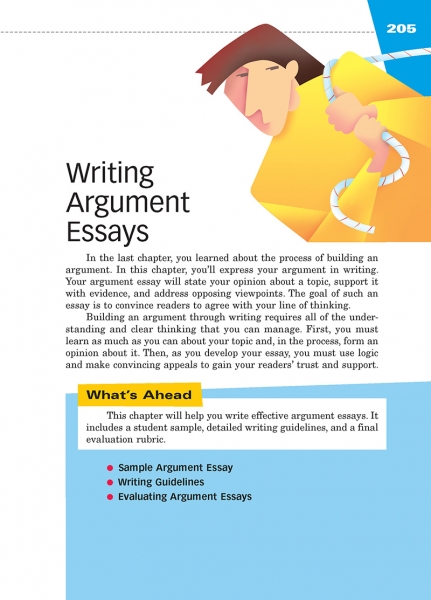Page 205 from

Start-Up Activity
Bring a rope to class and stage a tug of war. Pick two captains, and have them each choose three team members. Then have them compete against each other to win the contest.
Afterward, ask the rest of the class what the winning team did that got them the victory. They will probably say things such as, "Had the biggest, strongest people" or "Leaned back right away" or "Put people in the right order, with a strong anchor" or even "Had the best shoes for tug of war." All of these can be reasons for a tug-of-war team's success.
Let students know that when they write an argument essay, they are on one side of the rope, trying to pull the reader to their side. They can do so if they "Have the biggest, strongest ideas" and "Lean in to their position" and "Put their points in the right order, with a strong anchor" and even "Have the best details for arguing." This chapter (and the previous) will guide them to victory.
Think About It
“It takes all kinds to make the world go 'round. If everyone was straight-laced and uptight, it would sure be a drag. We need a little tug of war in society.”
—Nikki Sixx

Start-Up Activity
Bring a rope to class and stage a tug of war. Pick two captains, and have them each choose three team members. Then have them compete against each other to win the contest.
Afterward, ask the rest of the class what the winning team did that got them the victory. They will probably say things such as, "Had the biggest, strongest people" or "Leaned back right away" or "Put people in the right order, with a strong anchor" or even "Had the best shoes for tug of war." All of these can be reasons for a tug-of-war team's success.
Let students know that when they write an argument essay, they are on one side of the rope, trying to pull the reader to their side. They can do so if they "Have the biggest, strongest ideas" and "Lean in to their position" and "Put their points in the right order, with a strong anchor" and even "Have the best details for arguing." This chapter (and the previous) will guide them to victory.
Think About It
“It takes all kinds to make the world go 'round. If everyone was straight-laced and uptight, it would sure be a drag. We need a little tug of war in society.”
—Nikki Sixx

